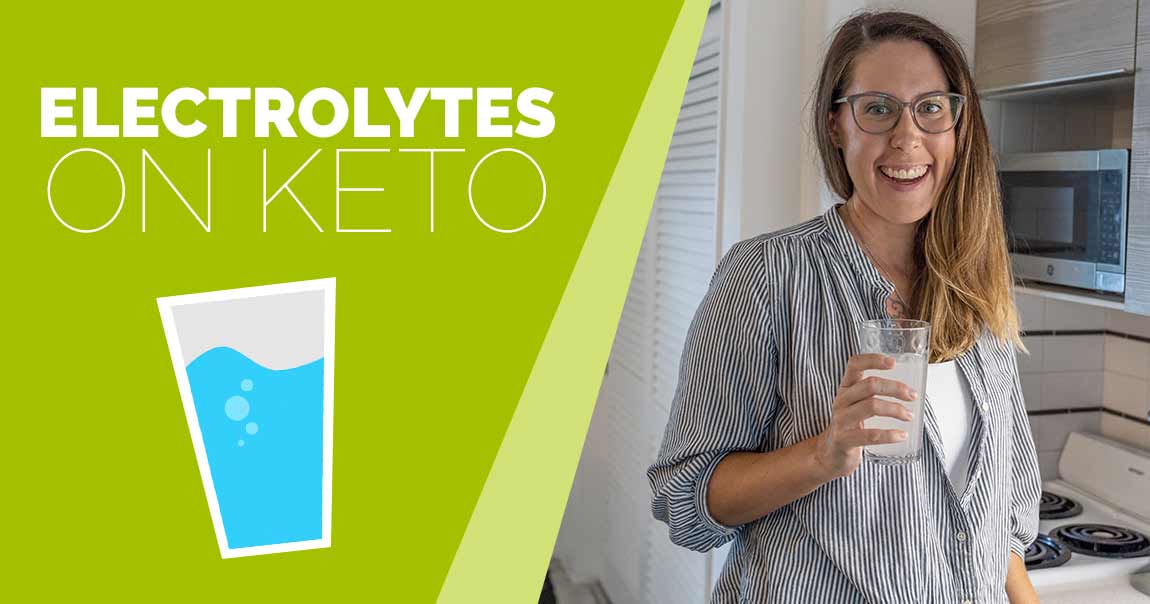I want...
The role of electrolytes on keto
March 3, 2021 By
Leanne Vogel

 June 27, 2021
June 27, 2021

I was meeting with a client the other day; let’s call her Susie, and I asked, “How many electrolytes are you taking per day?” Her response was, “Nah I don’t bother with them.”
Susie went on to tell me how lousy she’s felt since starting keto. “Something’s wrong.” She describes to me during our first meeting. “I get this weird heartbeat… I feel like my heart is going to just… stop sometimes. And there are days where I am just so tired. I don’t think keto is working for me.”
Susie has been following a keto diet for 3 years… and has never supplemented with electrolytes. After today’s newsletter, I hope you see that electrolytes are the #1 thing Susie could incorporate into her diet to see an immense improvement in symptoms…
So, let’s GOOOO!
Why we need electrolytes on keto
Low-carb diets make electrolyte deficiency much more common.
- Over 70% of dietary sodium in the American diet comes from packaged foods.
- When you switch to a low-carb diet that primarily consists of whole foods, you likely are NOT getting enough sodium.
- A low-insulin, low-carb state tells your kidneys to excrete more sodium leading to headaches, muscle cramps, fatigue, and mood swings.
However, these symptoms can be mitigated or even wholly prevented through proper sodium consumption!
What electrolytes do
Electrolytes conduct electrolyte charges in your body. Every message sent through your nervous system (including your brain) involves electrolyte transmissions – or nerve impulses – between cells. You need electrolytes, especially sodium and potassium, in order for nerve impulses to fire.
Electrolytes also help you produce energy, strengthen bones, regulate fluid balance (blood flow), regulate blood pressure, help conduct nerve impulses, promote the release of vasopressin (or antidiuretic hormone) which helps you sleep through the night, aid in energy (ATP) production, contribute to DNA synthesis, regulate blood sugar levels, help muscles contract (including your heart), and increases the absorption of certain nutrients through the gut.
As you can see, they do a lot.
The role of electrolytes in fasting
Fasting depletes sodium levels. Fasting and the ketogenic diet provoke similar metabolic responses. Both regimens, because they minimize carbs, also minimize spikes in blood sugar. When blood sugar is minimized, insulin is minimized too. Insulin tells your kidneys whether to retain sodium. So, when your insulin levels are low, you excrete sodium at a high rate.
Supplementing sodium = less weight rebound
When you fast, your body breaks apart glycogen (stored sugar) to meet your brain’s ravenous glucose needs. This process releases LOTS of water which you subsequently pee out. However, when you start eating again, water is retained and weight rebounds. Sodium supplementation dampens this effect – to keep the weight that you lost during your fast, lost.
OK — so, now you see why Susie needs to up her electrolyte game, right?
There are a couple of ways to do this.
One, is by incorporating low-carb foods that are rich in electrolytes.
Second, is to incorporate an electrolyte supplement daily to cover all your bases.
I like the combination of electrolyte-rich foods AND electrolyte supplementation to ensure you’re getting adequate amounts, and leaning on whole food sources.
My favorite electrolyte is this one. No funky ingredients, just electrolytes. LMNT is the leader in the electrolyte space, and they always have awesome deals going on, making electrolytes accessible for all.
Avoiding keto flu
Having been on a keto diet for 7 years, I understand that the keto flu can make you want to give up. Headaches, muscle cramps, and low energy sound like pretty good reasons to quit. But more often than not, the keto flu is a simple case of sodium deficiency and once you dial in your electrolyte intake those unpleasant symptoms disappear.
Today I feel amazing on keto – but it wasn’t always smooth sailing. At the start, I made ALL the mistakes. I didn’t understand just how important electrolytes really are. As a result, I frequently felt a little off and struggled with a lot of those funky keto flu symptoms.
And still, 7 years into keto, I often forget that I have a need for extra electrolytes. It’s easy to forget because most electrolyte products don’t taste good or work very well – except for LMNT!
LMNT Recharge provides me with sodium, potassium, and magnesium in the perfect balance so I can feel my best on keto. On top of that, the grab-and-go packets are super easy to use so I never forget to properly hydrate. I just add one packet to my water when I wake up so that I’m replenishing my electrolytes first thing in the morning. All of the flavors are incredibly delicious and yes, they’re salty – as they should be!
And maybe some of you have questions about sodium intake (sodium is an electrolyte!), and some concerns over supplementing with electrolytes (which contain sodium)?
Today is a perfect day to explain why I’m not concerned over supplementing with sodium, and perhaps why you may not wanna be either!
We’re all familiar with the statement, higher sodium intakes are linked to higher blood pressure, or hypertension. Ya?
There’s a whole other group of people who point to the science saying that the MORE salt you consume, the lower your risk factors…
So is salt good or bad for you?
The role of sodium
Sodium is not an optional mineral. Even low-salt advocates aren’t calling for zero sodium. You need a bare minimum, probably around 500 mg daily, to squeak by—though this says nothing about optimal intakes.
If your diet is very low on salt (as are all whole food diets), your body goes into sodium-sparing mode. Certain hormones kick up, and you pee out less sodium.
The main functions of sodium in your body include:
- Regulating fluid balance outside your cells (i.e. helping your blood flow)
- Conducting nerve impulses in your brain and nervous system
- Maintaining blood pressure
- Helping transport nutrients through your gut
These are some pretty essential things!
Why restriction isn’t a good idea
When you restrict salt, your kidneys pee out less sodium to preserve what you got. And, this process comes with consequences. Namely, a flood of hormones like aldosterone, renin, and norepinephrine with potentially undesirable effects.
Both renin and aldosterone raise blood pressure. And norepinephrine isn’t a “bad” hormone per se. It helps get you going. But norepinephrine is also part of the stress response, and boosts levels of the blood-pressure-spiking renin.
So, you see, there needs to be a balance. Too much of a good thing is unnecessary. But not enough of it? Not so good either.
This is why I feel 100% OK with supplementing with electrolytes.
Hi! I'm Leanne (RHN FBCS)
a Functional Medicine Practitioner, host of the Healthful Pursuit Podcast, and best-selling author of The Keto Diet & Keto for Women. I want to live in a world where every woman has access to knowledge to better her health.





